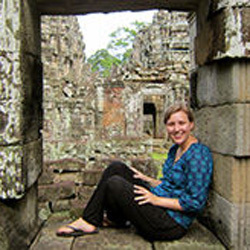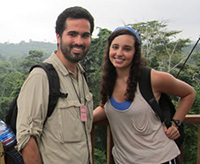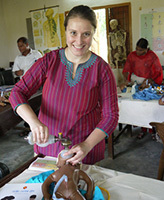

What if an undergraduate “minor” were not so much a secondary course of study but the centerpiece of a student’s entire Notre Dame undergraduate education?
That scenario perfectly describes the experience of the first cohort to complete the International Development Studies (IDS) minor administered by the Ford Family Program in Human Development Studies and Solidarity at the Kellogg Institute for International Studies.
“The IDS program totally shaped my experience at Notre Dame,” says Kristen Kelly ’13, who spent two summers with the Ford Program in eastern Uganda and then returned to the country after graduation to work with Pathways Development Initiative, an NGO focused on education.
“Our experiences and the exposure we had to an array of development theories and scenarios influenced how I think about everything.”
A Coherent Academic Program of Development Studies
“The IDS minor was established for students to delve into the meaning of development, to understand the complex interrelationships between economic, political, social, cultural, and religious factors in the development process—and to relate real-world issues to scholarly theoretical ideas about less-developed countries and communities in a global economy,” says the minor’s director Amitava Dutt, a professor of economics and political science in Notre Dame’s College of Arts and Letters and a faculty fellow in the Kellogg Institute.
“This is not a minor that a student adds after the fact,” explains Kellogg Assistant Director Holly Rivers.
“It is a carefully conceived course of study consisting of 15 credit hours in a variety of disciplines, both gateway and capstone courses, and the critical component of a significant field experience in the developing world.”
Turning Idealism Into Meaningful Action

The seven students in the first IDS cohort came to the minor from a variety of majors but with one common denominator: a curiosity about development issues, a passion for international experiences, and a willingness to explore issues from multiple perspectives and disciplines.
“It’s a big world. I want to explore it—and to see what I can do, ” says applied mathematics major Jamie Murray ’13, expressing a sentiment that propelled her and others into the minor.
When Murray switched her major from political science, the IDS minor became “the perfect complement” to her math studies, she says, opening up a path to explore both her academic passions.
Murray met the other members of the cohort—all with their own unique disciplinary interests—in the minor’s Introduction to International Development Studies, taught by Rahul Oka, Ford Family Assistant Professor of Anthropology and Kellogg faculty fellow.
“My aim in the gateway course is to give a realistic introduction to the field of development studies,” Oka says. “Students so much want to do something for the world.
“But development is not just about effort; it is about proper action—that is, understanding local cultures and what might work where. In that first class, students come to see that development projects must be locally feasible and take into account the consequences of action, including consequences that might be totally unintended.”
The Ripple Effect of the IDS Minor
The transformative effect of the minor begins to unfold early, with many students finding their IDS classes and activities so influential that it guides their experiences in their majors as well.
“Being an IDS minor definitely affected what classes I looked for in my major discipline and even how I processed information in those classes,” says biological sciences major Abbie Naus ’13.
A strong emphasis on crossing disciplinary boundaries stretches IDS minors in important ways.
“The requirement to take courses outside of your college forced me out of my comfort zone and into electives that made me think about the issues differently,” notes science preprofessional studies major Hannah Reiser ’13. “The interdisciplinary of the minor is one of its best aspects.”
In another of the minor’s key strengths, students learn not only from their professors but from each other—through classes, informal get-togethers, and participation in the Ford Program’s annual student-led Human Development Conference (HDC), which anthropology major Margot Morris ’13 calls the highlight of her IDS experience.
“The HDC allows students to showcase their research and tangible contribution to the field, while also encouraging peer collaboration and discussion—both very real aspects of how progress occurs in development,” Morris says.
A Field Experience Like No Other

Key to the IDS experience is the summer field research students complete in preparation for the senior-year capstone class.
“Whether you’re coming from math or anthropology, going abroad gives you a global perspective,” says Kara Ryan ’13, a science preprofessional studies major who conducted research with the Indian Institute of Management in Bangalore. “It changes your education in profound ways.”
That was certainly true of business major Luke Heneghan ’13, who studied worker motivation in Zambia with the for-profit social enterprise Zambikes, which aims to create jobs while providing Zambians with efficient transport solutions.
“My IDS classes and my own experiences in the field,” he reports, “taught me to approach development projects with a critical eye that seeks improvement.”
Reiser discovered the same in her work in Bangladesh with a Save the Children team that administers the national Helping Babies Breathe (HBB) program. To investigate the efficacy of provider training, she traveled to rural hospitals and evaluated the HBB skills of 67 providers. Save the Children is now using her findings in advocacy and planning meetings with governmental offices.
Integrating Fieldwork and Classroom Learning
All IDS minors come together senior year in a capstone seminar that provides a forum for them to process their field experiences and integrate them with learning in the classroom.
“We need more than good intentions if we are going to play a role in promoting authentic human development,” says Ford Program Director Rev. Robert Dowd, C.S.C., who teaches the seminar.
“In the capstone, students get valuable feedback from each other that helps them to present the results of their research clearly and to discuss its real-world policy implications. I encourage the students to think creatively to effectively address the thorny problems of human development they try to tackle.”
“The capstone provides such an important forum for making sense of your experiences abroad,” says Kelly. “While we were not technically representing our fields in the class, to a certain extent we brought those different perspectives to the table. I wouldn’t have known about all the global health perspectives had it not been for the capstone.”
As all seven students launch their careers, they know the critical importance of their studies together.
“The IDS minor offers so many different ways to think about development,” says Ryan. “It provided us each with a unique opportunity.”
Learn More>
Originally published at kellogg.nd.edu
Originally published by at al.nd.edu on September 05, 2013.